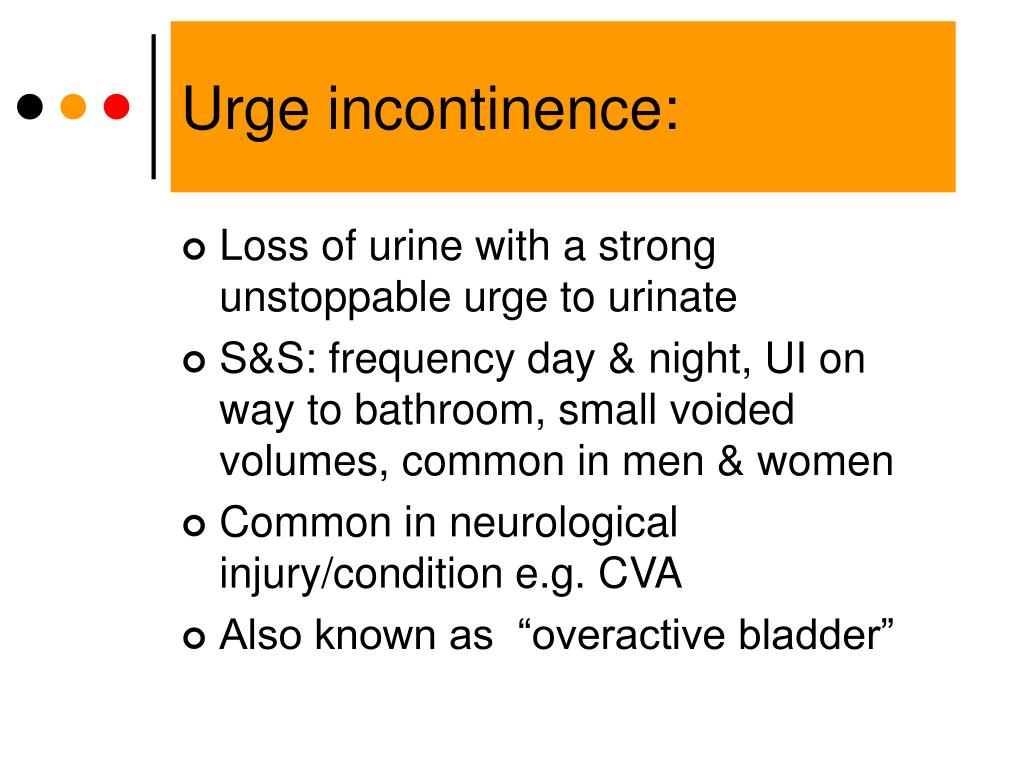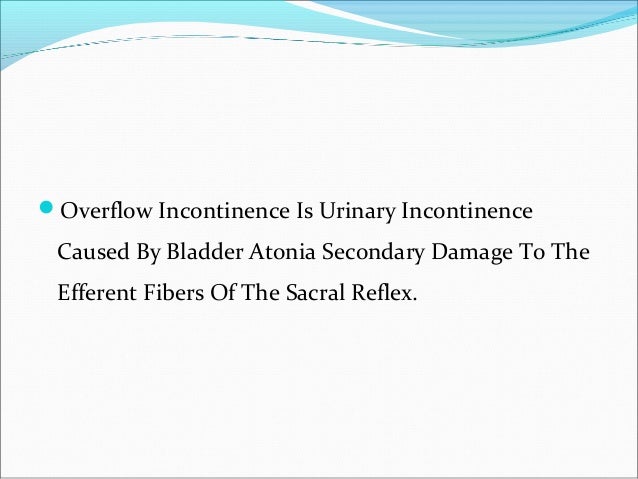

Risk factors for fecal incontinence in stroke include: Many more incontinent stroke patients receive permanent nursing home placements than continents. A stroke can cause a decrease in sensation and coordination of the rectum’s autonomic reflex system, causing the inability to control bowel movements.įecal incontinence among elderly people living at home was more frequent in those with a stroke. Approximately 40% of patients experience FI immediately and 10-19% of patients six months after a stroke. Fecal incontinence – involuntary loss of feces.įecal incontinence (FI) is common after a stroke.This can be caused due to loss of feeling in the lower abdomen/perineal area, or difficulty in emptying the bowels effectively. Mucus incontinence – mucus leaks due to the bowel being too full.The inability to decipher between stool and flatus leads to unexpected accidents.
#OVERFLOW INCONTINENCE STROKE FULL#
Flatus bowel incontinence – the sensation of a full rectum. Anal Incontinence – involuntary loss of feces, flatus, and/or mucus. Types of Bowel Incontinenceįecal incontinence is the inability to control bowel movements, causing stool to leak unexpectedly from the rectum. 4 Bowel Problems After StrokeĪ considerable proportion of stroke patients suffer from gastrointestinal complications, including dysphagia, gastrointestinal hemorrhage, and constipation.ĭepending on the changes in the central and peripheral nervous systems, and enteric nervous system, the transit time through the small and large intestines can be delayed, and result in incomplete bowel movements.Īn effective bowel program for stroke patients is an essential component of a person’s quality of life and freedom. After a stroke, lesions in the cerebral cortex, basal ganglia, brain stem, cerebellum, and lower cranial nerves may result in constipation. Thus, constipation can be affected by lesions of the central and peripheral nervous systems. The brain–gut axis or gut–brain axis is often referring to the bidirectional communications between the central nervous system (CNS) and the gastrointestinal (GI) tract (microbiota and immune system). In 2010, a neuroscientist in North Carolina discovered the Enteric Nervous System, a network of neurons that is practically a brain unto itself. Stroke patients associated with GI complications often have poor outcomes, with increased mortality rates and deteriorating neurologic function. Brain injuries, particularly stroke, have been well established as a cause of GI disorders and recently vice versa. There is a growing link between the gut and cardiovascular disease. severe headache without any obvious cause.Īfter a stroke, up to 50% of patients experience GI complications, including constipation and fecal incontinence, due to the disruption of the brain-gut axis that occurs with cerebral injury. confusion, trouble speaking, or difficulty understanding speech. slurred speech, difficulty speaking, or trouble understanding speech. dizziness, difficulty walking, poor coordination and/or loss of balance. numbness or weakness in the face, arm, or leg, especially on one side of the body. The most common symptoms of a stroke include quick onset of: Hemorrhagic stroke occurs when a blood vessel bursts within the brain. 
Ischemic stroke occurs when a blood clot blocks the blood flow in an artery within the brain.


The risk of having a stroke more than doubles each decade after age 55. While aging increases stroke risk, nearly 25% of strokes occur before age 65. It is also the most common cause of severe physical disability. There are approximately 795,000 new stroke cases in the US each year, leading to roughly 140,000 annual fatalities. Stroke is the third most common cause of death in the United States, after heart disease and cancer. Constipation and fecal incontinence affect patients at all ages and stages of life, but for those who have suffered a stroke, these conditions can have an ongoing impact on comfort, autonomy, and risk of more serious health complications.








 0 kommentar(er)
0 kommentar(er)
